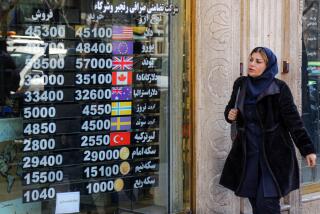France, Iran Strive to Get Diplomats Home : Negotiations Begin on Expulsions as Police Continue to Surround Paris, Tehran Missions
- Share via
PARIS — France and Iran began negotiating Sunday to find a way to get their diplomats and other embassy personnel home, now that each government has broken relations with the other, according to reports here and in Tehran.
French sources said the two countries are in contact to devise a satisfactory method by which the exchange of personnel can be carried out in the coming week.
In Tehran, Prime Minister Hussein Moussavi confirmed that the two sides are in contact on the issue through what he called “normal” diplomatic channels.
Deadline Relaxed
At the same time, French sources indicated that the government here is relaxing a Wednesday deadline it had set for expelling Iranian personnel in Paris back to Tehran.
This was modified, according to these sources, because the French government realized that it would be imprudent to allow the Iranians to fly home before making certain that French personnel in Tehran would be permitted to leave Iran.
The police of both countries have surrounded the two embassies, in Paris and Tehran, and restricted access to the buildings.
The French were worried by an announcement made Saturday by Iran’s interior minister, Ali Akbar Mohtashami, that French diplomats in Tehran will be tried for espionage. Mohtashami did not specify the names or number of diplomats involved, but he accused them of helping foes of the Iranian government escape from Iran and serving as links among anti-government movements.
Fifteen French citizens are based at Paris’ embassy in the Iranian capital, 11 of them with diplomatic rank.
A French authority declared Sunday that the evacuation of diplomats from both sides could be “long and difficult.”
In Paris, the five Iranian diplomats formally accredited to this country have been confined to the embassy building, a handsome structure in a posh residential district near the Seine River.
Similarly, in Tehran, French Embassy personnel have been restricted to the building. Only the embassy charge d’affaires, Pierre Lafrance, is being permitted to leave the premises for talks at the Iranian Foreign Ministry.
Envoy Speaks of Hope
“We’re waiting,” a French Embassy officer in Tehran, reached by Agence France-Presse, the French news agency, was quoted as saying Sunday. “Hope is keeping us alive.”
Both embassies were being supplied with food and other necessities, according to reports here and in Tehran.
In another development, Abdul Sattar, third-ranking official in Pakistan’s Foreign Ministry, flew to Tehran on Sunday after Iran reportedly asked Pakistan for help in the diplomatic dispute, the Associated Press of Pakistan reported.
The French severed diplomatic relations on Friday because the Iranian Embassy refused to let Paris police question Wahid Gordji, identified by Iranian officials as an embassy interpreter, about a wave of terrorist bombings in this capital last year.
Link to Bombings
The French believe Gordji is an Iranian intelligence officer, and an investigating magistrate has ordered that he be questioned about links he is alleged to have with persons accused of taking part in the bombings.
The Iranians insist that Gordji has diplomatic rank and is therefore immune from questioning under the Vienna conventions governing diplomatic practices. However, the French say that Gordji, a longtime resident of Paris, was never listed with the Foreign Ministry as a diplomat assigned to the Iranian Embassy and therefore has no such immunity.
When the French position was first made clear nearly three weeks ago, Iran promptly accused Paul Torri, a French diplomat posted in Tehran, of spying and dealing in drugs, a move the French saw as a blatant reprisal for France’s wish to question Gordji.
Official relations between the two nations quickly went downhill in what some here called “a war of the embassies,” culminating Friday when Paris broke with Tehran and Iran retaliated by breaking ties with France.
The French seemed to have second thoughts Sunday about how their expulsion of Iranian Embassy personnel could be achieved--while at the same time carrying out the interrogation of Gordji--without endangering their own diplomats and possibly other French citizens in Iran.
For while the French are sometimes credited with creating many of the conventions of modern diplomacy, the Ayatollah Ruhollah Khomeini’s Islamic revolutionary regime in Iran does not play by the rules.
In 1979, angered when the United States let the deposed Shah of Iran enter the country for medical treatment, the Iranian extremists attacked and overwhelmed the U.S. Embassy in Tehran, seizing many of its personnel. Fifty-two Americans were held hostage for 444 days.
Seeking Assurances
There is no reason why Iranians would not do the same to the French, sources here speculate. Therefore, they say, it behooves the government to prevent Iran’s diplomats from leaving Paris until authorities are assured that French diplomats will be allowed to leave Tehran or until the crisis is otherwise resolved.
France nevertheless remains determined to question Gordji, External Relations Minister Jean-Bernard Raimond said in a television interview Sunday night.
“Gordji will not go home so long as he does not submit himself for questioning,” Raimond said. “He has been subpoenaed for questioning, and the law in France, where the judiciary is independent, is quite clear on this.”
Raimond plans to leave Paris today for a meeting of the U.N. Security Council in New York to support a pending resolution calling for an immediate cease-fire in the Iran-Iraq War.
More to Read
Sign up for Essential California
The most important California stories and recommendations in your inbox every morning.
You may occasionally receive promotional content from the Los Angeles Times.













